And yes, the image is degraded, though what is there (the poetry, the performance) comes thru. It’s curious, to me, how the degraded image isn’t just a “poor” image — I’m writing up now my remarks from the Oakland conference last October on a half dozen Poetry Center videos of Alice Notley: have to listen to what I said there and come up with some kind of transcription. There’s a poet’s measure of seeing video that’s very different from the consumer model of quality control, sharpness, fidelity.
—to Patrick Durgin, June 9, 2015, on a 1983 video recording of Hannah Weiner
A transcription of a talk at the “Alette in Oakland” celebration of Alice Notley and her work, held in late October 2014, sponsored by the Bay Area Public School, at Omni Oakland Commons. The proceedings of the three-day symposium will be published by Hearts Desire Press, who also brought out Notley’s book Manhattan Luck.
[R&B fanfare comes on. Woman singer: “I feel so good…” Cuts off abruptly.]
Soundcheck. . . . Actually, I looked for that song for many years. I heard it on the radio about fifteen, twenty years ago. The title is “I Feel So Good, I Must Be Dead.” And about three or four weeks ago it turned up on YouTube. Well, there you go. But I’d asked everybody, nobody’d ever heard of the song. Now it’s on some anthology of R&B from the ’50s.
I’m going to talk about the fact that The Poetry Center at San Francisco State has hosted readings by Alice Notley since 1976 — the first one — and, just literally within the past two days we managed to get these videotapes transferred and online. And I wanted to just start by thanking Jiri Veskrna, who transferred a number of them, recorded a number of them; he’s been with The Poetry Center for a long time. And also Elise Ficarra, who’s very much behind the creation of this platform called Poetry Center Digital Archive. And then, the first of these two recordings that we have now available, from 1976 and 1984, they are in a format that we can no longer play. They’re on ¾-inch U-matic video cassettes, and our players burn out over the years. They’ve been transferred, along with some NEA funds — the funds were given to BAVC, the Bay Area Video Coalition, here in San Francisco, and they give us a very deep discount because of the subsidy through the NEA. Anyhow, there is that credit that’s due.
We’ve been slow at getting video online. So, really, these are the first of our videos to actually be available online. Video at The Poetry Center starts in 1973, with a reading by George Oppen and Robert Duncan, that has now been digitized, and it’s headed toward the internet. It’s really a question of labor. We have like zero staff to do this, basically. At some point there were five people that worked for The Poetry Center. Now there are 2.1 persons that work, and the .1 person is the one that has to do everything.
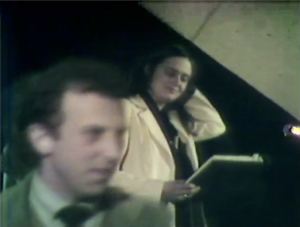
So, I’m really happy that we’re able to debut these videos. I just want to talk very briefly about each one, and then play a little bit from one of them. The first is [February 18] 1976, it’s Alice Notley with Bill Bathurst. Lewis Mac Adams is directing the Poetry Center at the time. Our notes say she’s visiting from Chicago; I believe that comes out of a spoken moment in the introduction by Lewis. And this is in the Student Union at San Francisco State; they were calling it the Barbary Coast Room at the time, I guess for local color. It’s a color video. Bill Bathurst comes in about midway through, so it’s split between the two of them, all on one tape. I don’t think I’ll play any of that, actually, but just mention that’s the very first of the recordings here. And it’s from the era of Chicago magazine. So I’m really happy that Kaplan [Harris] is here, giving some of this history as well; this is very parallel.
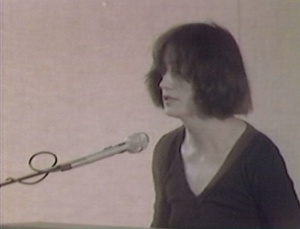
Then in 1984 [May 3] the reading — which I think I will play a little bit of it, to end this brief talk — is a reading where Margaret and Dusty has not yet been published, but some of the work that’s read is from that, and some of the other books [e.g., Waltzing Matilda] that are coming into print around that time. Shorter poems for the most part, but “My Bodyguard” is a longer poem that ends the reading. For this one, Laura Moriarty was on the same bill, but she wasn’t on the same tape. We sent the tape off to BAVC, the Alice got transferred, and the Laura did not get transferred. We’ll get there one day.
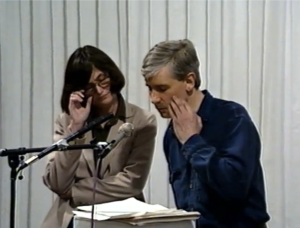
[April 25] 1991, then, is the “Scarlet” era, really — Scarlet magazine is taking place; The Scarlet Cabinet is yet to be published, which collects the work that Douglas Oliver and Alice Notley are doing together at the time. Poems in parallel, a very large tome, The Scarlet Cabinet. But this is a very early reading of The Descent of Alette, which was included, then, in The Scarlet Cabinet, and then was published by Penguin several years later. Douglas reads for about forty minutes from his work. He reads a short poem from his book Kind, which was a British publication, and then “Three Variations on the Theme of Harm.” And he does this very funny thing where he’s trying to do the American voices, so there’s this very exaggerated attempt at giving street speech from the Americans — putting that across in his poems. Eventually he gets Alice on stage to do the American voices. So then, she appears in part one, and then part two, here, is Alice’s own reading, and that’s from the first and third books of The Descent of Alette.
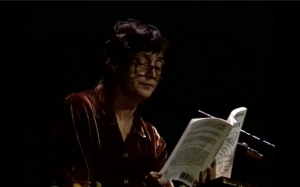
In 2001 [November 10], a decade goes by; we host a reading together with Aaron Shurin, who was at USF — the University of San Francisco starts its writing program and he’s hired to be a co-director. He had been formerly with The Poetry Center, so this is a fantastic full-time job for Aaron, and we were all very happy to have him there running that program. I came to The Poetry Center in 1999, and so we co-hosted this between SF State and USF. It’s at what was called The Gershwin Theater, and I always joke — they took away the name eventually, as I say, they discovered the Gershwins were Jewish or something, at the Jesuit college, and they renamed the theater. It’s a beautiful theater; it’s a packed house, as I remember. The poems that are read are three long poems: so we’ve entered this era of the new longer work. White Phosphorus is one of them. It’s being read, because, what’s happening in the Fall of 2001? September 11th is happening. The invasion of Afghanistan is underway. So Alice has said in the recording here that she’s been reading from White Phosphorus on this tour, which is a poem written in memoriam to her brother, who had died after being a Viet Nam War veteran and having PTSD. So White Phosphorus is read, and then a selection from Disobedience, a new Penguin book that is just out at this time, and then her version of Iphigenia, which Belladonna later put out, the following year. Aaron Shurin does the welcome, I give the introduction. A beautiful reading.
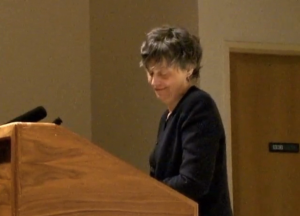
In 2006, The Collected Poems of Ted Berrigan has been edited and has come into print from the University of California Press. And so we are hosting an event to celebrate The Collected Poems, but two days prior to that — that was Saturday night at the Unitarian Center, a lot of local people came out to read from that book, a beautiful evening. Two days prior [March 9, 2006], we had — Anselm [Berrigan] and Edmund [Berrigan] and Alice were all in town, and it was a fantastic opportunity to have the three of them read together. This took place at San Francisco State, in our Humanities Auditorium. Part one is Edmund, followed by Anselm reading, and then part two is Alice’s reading. It’s all pretty much new work that’s being read, on that occasion in 2006. And then a couple days later we do the tribute to Ted, based on The Collected Poems of Ted Berrigan.
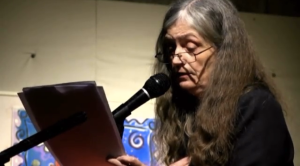
And then the final recording that we have up is of a recent reading, from 2012, in December [December 1]. Many of you were probably there in the house. [Laura Woltag introduces, for a solo reading co-sponsored by The Poetry Center and Small Press Traffic.] It was at the Unitarian Center, a very rainy night. Remember rain? Alice gave a very generous reading, that [on the video] breaks into two parts. Culture of One is being read from; Songs and Stories of the Ghouls; and then an unpublished poem. About twenty-five minutes or so of this new work is read, and one of the highlights is an intervention from a geriatric heckler, and Alice — without skipping a beat — snaps “Fuck off!” and goes back into the poem. That’s about three minutes before the conclusion of part two.
My sense about this material is that . . . Richard O. Moore is the gentleman who produced in the 1960s the programs that were called “USA: Poetry.” The Poetry Center has the outtakes, and we’re working to get those online. Richard Moore’s sense is that these were produced through public funds, so they’re public property. They should really be out there. They should not be “controlled” by WNET, regardless of what they are, in New York, and so forth. So hopefully we’ll have these “outtakes” on line very soon. But that’s my sense with this work, too. It is produced through public funds. It’s our work. So getting it online and publicly available is something I’m very invested in doing. Hopefully some of the resources are going to come forward to make that a little more possible.
I’d like to just watch a bit of this 1984 reading, which for me at the moment is the most intriguing. I wasn’t there. I was there for the subsequent readings. This is at San Francisco State, the Student Union. It is a color recording, a color video. BAVC has done some beautiful work on it, in order to bring it into the condition that it’s in. So you’ll see color appear a little bit. It looks almost sepia-toned, but somebody walks onstage and a shirt will show up. I think I’ll just play a couple minutes of this.
[Video plays: Audience chatter. Poetry Center Director Jim Hartz introduces: “Alice Notley is going to read now. Also, she is reading tomorrow with Philip Whalen. And the time and the place exactly? Eight o’clock at New College, tomorrow night. Alice has eleven books to date, including Doctor Williams’ Heiresses, which was originally given as a talk at 80 Langton Street some years ago, that Tuumba Press brought out. Also, How Spring Comes, which won the Poetry Center Book Award for 1981, which was judged by Kathleen Fraser and Jack Marshall. And also Waltzing Matilda, and Sorrento, which is a forthcoming book. Alice Notley.” Applause.
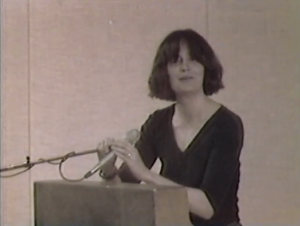
Alice Notley [moves the microphone]: “Should I tamper with this? Can you hear me? [pause] Are you sure you can hear me? Is it better if I lean into it? It is? How can I do that? Dammit. Can I make it higher? [the microphone gets adjusted] That would be wonderful. Thank you. Okay.”
AN reads “Margaret and Dusty.”
AN reads “History of the World.”
AN: “Boy, I really blew that one.” Video paused.]
For me, all the time, much of the value of these recordings is in the marginalia: the fact that this reading by Philip Whalen was happening the next night. With Philip Whalen, at the New College, so that history comes in. Beautiful. All the things that you can’t go off and read in a book, that are there. Thank you, I think that’s it.
October 25, 2014 / posted June 27, 2015
Steve Dickison
The nine video recordings, from six occasions, are accessible online at Poetry Center Digital Archive.
video recordings, from six occasions, are accessible online at Poetry Center Digital Archive.
“I Feel So Good (I Must Be Dead),” Maurice King & His Wolverines, featuring Ruby Jackson, recorded for OKeh, 1951, can be heard at YouTube.
Headline images: Alice Notley, stills from Poetry Center Archives color video recording of her reading, May 3, 1984, at San Francisco State University.